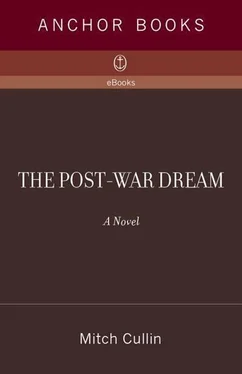By daybreak, however, the blizzard had reached its end, and soon sunlight vanquished those low-hanging, thick clouds. When a hard blue sky proclaimed the storm's departure, the neighborhood became a glaring sight to behold; the morning's rays were made radiant in the glossy ice patches embracing asphalt and in the immaculate snowfall blanketing yards. Then Hollis was at the window once again, standing there as if he hadn't ever left the living room. The Glenfiddich had been replaced with decaf, the coffee cup steaming while he squinted to perceive the ghostly reflection in front of him; cast discernibly now on the glass of the window, his chest's silver, coarse hairs looked golden, his forehead's rugged creases appeared less defined. He had slept less than four hours, having fallen asleep at about the time he would normally be waking up. Even so, his body felt rested, his thoughts lucid, the previous night's swift accumulation having enlivened him somehow; he was — as his wife, Debra, remained in their bed — fully awake and eager to venture into that bleak, muted scenery. But beforehand, Hollis decided, he would spend a few minutes at the computer — coffee cup on a coaster, an index finger pushing the keyboard buttons — typing a short addendum to the prologue section of his fledgling autobiography, lest he forget later on.
“Whenever something strikes you,” Debra had reminded him, “be sure you take note of it. Anything at all. You'll see, little details help create the best picture of someone.”
But he worried that the little details of his life weren't at all interesting.
“Nonsense,” she ‘d responded. “Everyone is interesting, and everyone has a story to tell. If you think on it long enough, you'll see how amazing your life has been up to this point. Look, you've gone from Tokyo to Tucson, and a bunch of places in between. Now that's something to write about.”
“I'm not sure everyone is interesting, Deb. I mean, what if I discover how incredibly dull I am, or how meaningless?”
“You won't, dear. Trust me.”
It had been Debra's idea that he should chronicle his life, an exercise which she believed could preoccupy the downtime of retirement and, she hoped, would foster some much-needed reflection on his part. Toward that end, she purchased a refurbished Mac and checked out several books from the library that she thought might motivate him (Fulton J. Sheen's Life of Christ, Sam Walton: Made in America , and Chuck Yeager's autobiography). As a young man, Hollis had considered becoming a writer (having immersed himself early on in the writings of Hemingway, Faulkner, and Steinbeck), but following his military duty, he found serious literary fiction less and less appealing for some reason — perhaps because of the subject matter's growing ambiguity and the unheroic nature of the characters, the increasing emphasis on the human condition's darker extremes. These days, however, his tastes were allied with the works of writers like Clive Cussler and John Grisham, heavily plotted but entertaining novels which more often than not didn't get finished before they were due back at the library; so while he appreciated Debra's gesture, the nonfiction books she stacked near the Mac received the slightest of considerations — the chapters flipped through, a paragraph or two perused at random, a bookmark stuck indiscriminately in the pages to give the false impression of a reading well under way.
But when beginning the process of addressing his own history, Hollis found the breadth of his life almost impossible to envision; it was, for him, like those casually regarded library books Debra had left for him — observed as fragments, equivocal in its significance, lacking a sustained coherence. Naturally there was childhood, teenage years, the war, marriage, work, and now retirement; yet it seemed so fleeting and generally unspecific, as if none of it added up correctly to the number of years he had actually spent alive. An apple born without a core, he concluded. A tree thriving without roots. And, as such, he didn't know how his story should commence, or what words he should choose in order to accurately describe it.
“You're making this too hard on yourself,” Debra had told him one night, upon learning almost nothing had been written during the two or three evenings he had spent sequestered in the home office. “Just keep it simple, and keep it honest.” She encouraged him to write for her, to describe the Hollis she didn't truly know, the Hollis who existed before they met: the small-town boy, the soldier engaged in frontline combat, the local hero. He should write about the war, write about Korea, write about that period of his life which continued to remain somewhat of a mystery to her — simply because he never liked discussing what he had once jokingly called the pre-Debrazoic era, shrugging his military service off as something he'd rather not revisit in a million years. “Who knows, it might become the first of your many books to come. Could even end up a major bestseller, you never know. Now wouldn't that be something?”
When she said this, Hollis recoiled his head and stared at her with disbelief.
“Hollywood might want to turn it into a movie,” she said, her voice as sincere as her expression. “Stuff like that happens more than you think.”
Hollis seemed unconvinced, but he nodded in agreement nonetheless. “That's all good and fine,” he said, “except I'm way out of my league here, Deb. I don't know how to get the ball rolling.”
She suggested he begin with lists, abbreviated outlines describing people or events which initially popped into his mind, various moments from the past and the present: “Like case studies, I guess, and you're the scientist. I don't think it has to be too complicated, though. One or two things, a couple of lines here and there about what someone does, their jobs, hobbies, things of that nature. Or if they're dead, something essential you remember about them. That'd at least be a start, right?”
“That's true.”
So he had returned to the office, resuming his place in front of the computer, and let his index finger hover a moment over the keyboard before finally tapping the letter S , though it would take almost an entire week to fill half a page with the most minuscule of beginnings.
Subject number: 01 Name: Hollis Adams Sex: Male Race: Caucasian Age: 68 Height: 6 feet, 1 inch Weight: 212 pounds, give or take
Overweight but not fat, muscular where it counts. Long face. Thinning gray hair still manages to cover entire scalp. Wore bifocals for over twenty years until having corrective laser surgery a while back. Scar on left inner thigh, result of wound while serving in Korea with the 2nd Battalion of the 7th Cavalry Regiment. Likes a drink on any occasion, doesn't smoke. Good at a lot of things but not great at anything. No notable talents. Coupled with wife Debra (65) for almost fifty years now. No children. Spent majority of life living and working in Arcadia, California. Born in Minnesota. Currently retired at Nine Springs, Arizona. Former director of production and sales for Dusenbury-Soper Lumber Company. Hobbies include gardening, fishing, flea markets, and golfing. Sometimes sits in on the Friday afternoon painting class at the Funtivities Center. Needs to get in better shape. Played basketball and six-man football in high school. In tenth grade, won a Civics Award. Lifelong Democrat until voting for Ronald Reagan's reelection. Voted against Bill Clinton in favor of George Bush. Voted for Clinton's reelection. Doesn't really follow politics anymore. Tries to enjoy life. Likes that the house continues to feel new. Enjoys working in the garden. Still hasn't gotten used to the Arizona summers yet. Has to watch blood pressure. Has considered medical hair restoration at some point.
Читать дальше










![Theresa Cheung - The Dream Dictionary from A to Z [Revised edition] - The Ultimate A–Z to Interpret the Secrets of Your Dreams](/books/692092/theresa-cheung-the-dream-dictionary-from-a-to-z-r-thumb.webp)

